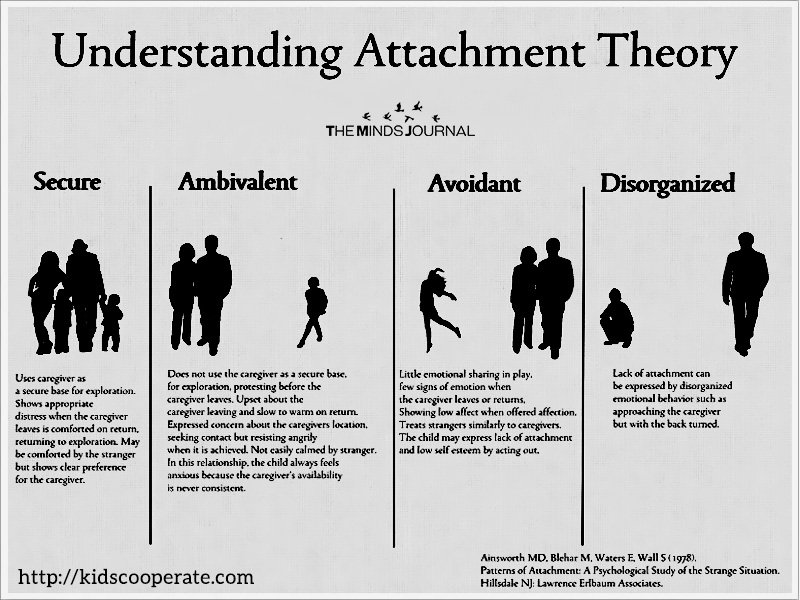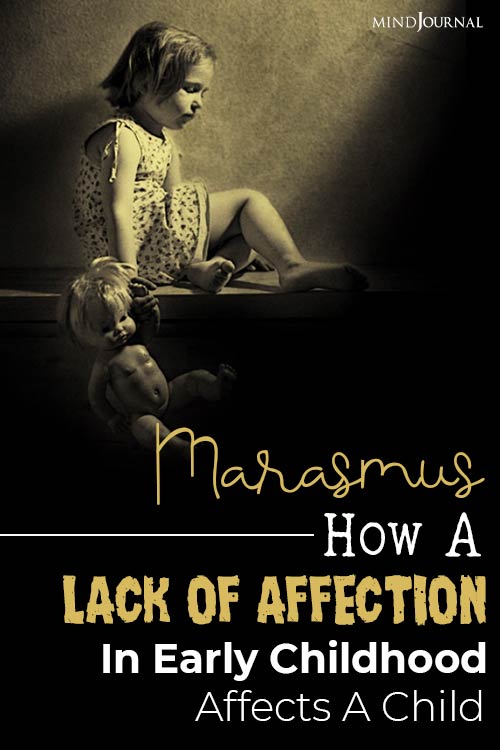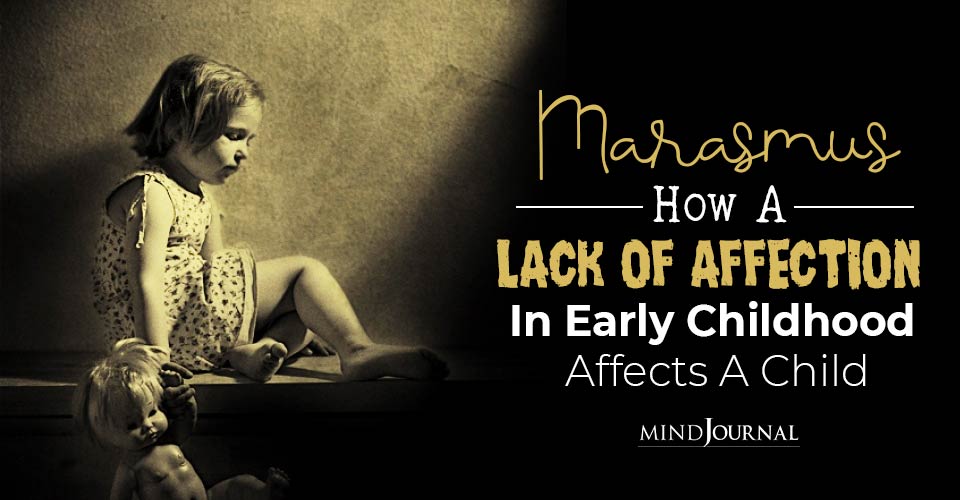When it comes to having a happy and healthy childhood, attachment and affection are extremely important and even non-negotiable. So, a lack of affection in childhood can determine to a huge extent, your mental health and psychological well-being when you finally enter adulthood, and this is where the concept of marasmus comes in.
When a child is separated from their primary attachment figures, (namely the mother), it can lead to devastating psychological consequences, which end up affecting their entire lives. It might even lead to death sometimes. The kind of affection and attachment a child is subjected to from their family and the environment they grow up in decides how they see and perceive the world when they become adults.
British psychologist, John Bowlby studied how the mother-baby bond is formed, and American-Canadian psychologist, Mary Ainsworth focused and wrote about the different attachment patterns a child gets to experience when they are young.
Now, let us find out what is marasmus all about and how lack of affection affects a child.
Related: 8 Things You Can Relate To If You Were Emotionally Neglected As A Child
Attachment Bonds In Childhood
Parental affection in early childhood is extremely important when it comes to the mental and emotional development of a child. Along with that, the attachment you form with your parents can decide the course of the kind of childhood you will have. When a child forms an attachment with their parent, it helps them explore and understand the world around them, and also helps in their learning. The kind of exploration and learning they get to do has a direct effect on their mental and physical development.
John Bowlby analyzed the creation of attachment bonds between mothers and their children, and also the stages of development that come with it. He observed that it is only from the age of 3 years that attachment bonds start to truly form, and this is the time when unhappiness, grief, and separation anxiety in the presence of strangers, while away from parents, start to make themselves evident.
On the other hand, Mary Ainsworth conducted an experiment that she termed the “Strange Situation”. In this experiment, she studied and analyzed the gaps between attachment figures like mothers and fathers and their children, in a more controlled manner She observed how children behaved when they were separated from their attachment figures, and then reunited again.
As per her observations and analyses, she deduced four kinds of attachment patterns, and they are as follows:
- Group A: Insecure avoidant attachment or rejecting attachment
- Group B: Secure attachment
- Group C: Resistant type attachment/insecure ambivalent attachment
- Group D: Disoriented/disorganized attachment
These attachment patterns vary from child to child and depend on the kind of affection they get or the lack of affection in childhood. Attachment issues in children or attachment disorders in children can be quite common in cases of childhood neglect and abandonment.

Lack Of Affection In Childhood: Long-Term And Short-Term Effects
The impact of parental affection on children, or even the lack of it can have far-reaching consequences on a child’s psyche and development. Be it short-term or long-term, lack of affection in childhood is bound to affect a child and is one of the major risk factors for marasmus. Let’s discuss the short-term effects of a lack of affection in childhood first.
Related: 5 Effects Of Growing Up As An Unloved Child And How To Heal
Short-Term Effects
Separating a child from their attachment figures before the age of 6 months won’t cause any major problems, since the attachment hasn’t yet become that strong or profound.
However, between the ages of 6 months and 2 years is a crucial time to be, since it is during this time that children start to understand and feel the bond, resulting in separation anxiety.
According to John Bowlby, these are the short-term effects of marasmus, which can be divided into three stages:
- The protest stage: This stage happens when a child realizes that they have been separated from their mother/father, and are alone. This stage can last roughly from one hour to a week. In this phase, the moment the child realizes that they are alone, they search for their attachment figures, cry and scream out for them, and even refuse support, affection, and help from other people. These kinds of behaviors get worse in public and social gatherings.
- The despair and ambivalence stage: In this stage, the child displays anxious behaviors and expresses feelings of utter hopelessness. Additionally, they might even display regressive behaviors, such as being hostile, difficult, and disinterested, especially in public gatherings.
- The adaptation stage: The child slowly starts to accept and adapt to the situation, and might even give the effort to forge an attachment with their new caregivers/potential attachment figures.
Long-Term Effects
When a child is unable to accept the loss of their attachment figures or is unable to adapt to the new situation, it can lead to many serious psychological and physiological consequences. Intellectual problems, depression, anti-social tendencies, and in some cases, death.
René Árpád Spitz, a noted Austrian-American psychoanalyst, observed that unmothered infants, or infants who were separated very early from their mothers, tended to suffer from psychogenic diseases.
He inferred this by observing hospitalized children who were separated from their mothers for a long time and even based his own studies on these observations. He even coined the term “anaclitic depression”, which was a result of emotional deprivation.
Anaclitic depression happens when the development of a baby gets impaired, due to long-term separation and emotional deprivation from the mother.
Anaclitic depression is also referred to as hospitalism syndrome sometimes. This name originates from the practice of abandoning children at the doors of institutions such as hospitals, police stations, fire stations, orphanages, or convents. In short, places that are capable of taking good care of children.
Hospitalism can lead to major psychological, mental, emotional, and physiological damage in abandoned or separated children (hospitalized). Additionally, there is always a strong possibility that social and cognitive problems may arise, and very quickly become chronic.
According to Spitz, some of the major changes that can occur are the following:
- Low resistance to diseases
- Delay in manual skills
- Slower physical development
- Lesser use of language
Children who suffer from an absolute lack of affection in childhood are comparatively thinner than children who have more or less a happier childhood. Sometimes, the emotional deprivation becomes so total and absolute, that it results in even death sometimes.
Related: 5 Ways In Which Lack Of A Mother’s Love Affects Her Daughter’s Life
Can Marasmus Cause Death?
Yes. Marasmus can cause death in some cases. This is because marasmus is a kind of extreme malnutrition that happens to children less than 18 months of age, due to the mother not feeding the baby. Because of this lack of nutrition, the nutrition deficit becomes so major, that the baby dies, unless they get proper attention and treatment at the right time.
However, marasmus can happen not just due to severe nutritional deprivation, it can also occur due to a severe lack of affection in childhood, and separation anxiety in children.
Blank stares, lack of crying, loss of appetite, hopelessness, depression, increasing disinterest in their environment, and oversleeping are just some of the serious symptoms of marasmus, which gradually might result in loss of life.
When it comes to children, they don’t just need food, water, or shelter, even though these things are extremely important. Children also need a lot of love, affection, and attachment, in order to grow and develop normally; nothing can replace parent-child affection.
The childhood experience of parental affection is crucial for the proper physical and mental growth and development of a child, and a lack of it can have disastrous and tragic consequences.
Want to know more about how a lack of affection in childhood affects a child? Check this video out below!









Leave a Reply
You must be logged in to post a comment.